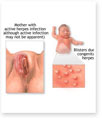Definition:
Genital herpes is a viral infection affecting the skin of the genitalia which is caused by the herpes virus. It is a common sexually transmitted disease that affects both males and females.
Alternative name:
Herpes Simplex Infection
Causes and risk factors
Genital herpes is caused by two viruses
- Herpes Simplex Virus Type 1 (HSV-1)
- Herpes Simplex Virus Type 2 (HSV-2)
HSV-1 causes cold sores and fever blisters around the mouth region and can spread to the genital area through oral sex.
HSV-2 is mainly associated with genital herpes. The virus spreads through sexual contact and skin to skin contact. Either oral or genital secretions are the mediums of transmission.
Since it is secreted from the oral and genital secretions it infects the related organs like anus, scrotum and inner region of the thighs, shaft and head of the penis, cervix, labia, vagina and mouth.
Signs and symptoms
Infection with HSV may or may not have symptoms. The patients without symptoms also transmit the virus and this too is a route of transmission.
In people who are symptomatic the presentations could be the following:-
- Small red bumps, blisters (vesicles) or open sores (ulcers) in the genital, anal and/or other intimate areas. The blisters are seen on the area around the genitals. They are small, filled with clear fluid and painful. There is an increased sensitivity of the skin before the appearance of the blisters. The blisters/ ulcers later on ruptures followed by oozing and bleeding.
- Pain or itching around your genital area, buttocks or inner thighs.
- There may be painful urination (if there is a lesion in the nearby area) and vaginal discharge (in women).
- There may be enlarged and tender lymph nodes in the groin.
- The systemic symptoms are fever, malaise, muscle pain and loss of appetite.
After the initial infection the virus invades the nervous system, thus escapes the immune response and remains there in dormant state. It may cause repeated symptoms.
Factors that trigger a recurrence are stress, fatigue, menstruation, and suppressed immunity.
Diagnosis
Doing viral culture, blood tests, PCR assay, Tzanck test of the skin lesion and serological tests can do diagnosis of genital herpes. Serological tests can determine whether the infection is newly acquired or from the past virus in the body.
Treatment
The disease cannot be cured only the symptoms can be relieved by anti-viral treatment. Anti-viral drugs also fasten the recovery. If treatment is started at the early stage the recovery is faster. If brain, eyes and lungs have the infection then treatment is given intravenously. Treatment may have side effects, which may be nausea, vomiting, fatigue, headache, seizures, rash, and tremor. Treatment for genital herpes can cause complications in immunocompromised people.
Gentle cleaning of the affected area with warm water and soap is recommended. If there is secondary infection then antibiotics may be given.
Expectations (Prognosis)
Once there is HSV infection, the virus remains in the body forever. Recurrence of disease may or may not be there. Genital herpes is rarely fatal.
For further information: www.eeealthbook.com

|